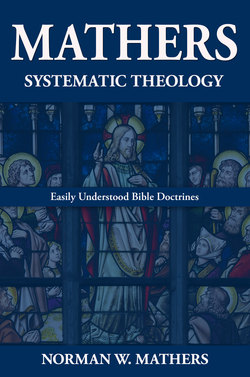Читать книгу Mathers Systematic Theology - Norman W. Mathers - Страница 25
CHAPTER 3 THEOLOGY PROPER 3.1 The Spirituality of God 3.1.1 God is Spirit.
ОглавлениеCharles Hodge’s (1975:1:378-379) presentation on the spirituality of God points to the fact that God can not be understood in terms of a material nature. Jesus said: “God is spirit and those worshipping” (present active participle- Han 1974:185) “Him must worship in spirit and in truth” (Dative of Means – dative case for both words spirit and truth). This is further explained by Jesus earlier in the context in 4:23. The gar (for clause) explains it: “The Father seeks such ones those worshipping Him” (Aland & Black 1966:334). Worship acceptable to the Father must be from the new nature (only those who have believed on Christ have the new nature as indicated by the word teknia-John 4:24, 1 John 2:1, 12, 28) and by means of the truth. True worship to God the Father must be through the Lord Jesus Christ by the power of the indwelling Holy Spirit. Jesus informed Nicodemus of two realms that which is born of the flesh and that which is born of the Spirit (John 3:6). That which is born of the flesh is the natural realm. That which is born of the spirit is the spiritual realm. That God is spirit is the eternal essence or being of the Father (John 4:23). Walvoord (1974:42) argues that this is an attribute of God. Erickson (2000:294) includes John 1:18, 1 Timothy 1:17, and 6:15-16 as applying to God’s invisibility. His invisibleness means that God is not perceived by our natural senses. The Lord Jesus exegeted (explained) the Father. “No one has seen God at any time only begotten God the one being in the bosom of the Father that one He himself has exegeted” (explained) [Him-brackets mine- Him is undertood] (John 1:18) [author’s translation] (Aland and Black 1968:322). The word begotten is the English translation of the Greek word “monogenes.” The meaning of this word has to do with the uniqueness of Jesus Christ. It has nothing to do with begotten in terms of origin. Jesus Christ is the eternal Son of God. Yes, the doxology on the part of the apostle Paul is addressed to the king, Jesus Christ (I Tim. 1:17) (Locke 1973:17). Further, the apostle Paul writes: “I command you before God the one making alive all things and Christ Jesus the having testified before Pontius Pilate the good confession, you to keep the commandment without spot until the appearance of our Lord Jesus Christ, it will be shown the blessed and only Potentate, the King of the reigning kings and Lord of the lords, the only one having immortality, and dwelling in unapproachable light” (unapproachable is in 2nd attribute position of the adjective – the emphasis is on the adjective – unapproachable) “whom no man has seen nor able to see. To whom” [be] “honor and eternal might. Amen” (1 Tim. 6:13-16) [author’s translation]. Eternal is in the second attributive position of the adjective to the noun kratos-might. Christ’s eternal might is the reverse of His glory. He has the might (muscle) of the ages (1 Tim. 6:13-16) (Aland & Black 1968:729). John 4:24 explains God’s essence that God is spirit. God is in another realm the realm of the spiritual. He is separate from the material, time, space, and physical realm yet omnipresent. He is present in creation with his whole being at every point in the universe (Hodge 1975:1:376-380). Bernard (1969:150) cites 1 Kings 8:27 and Isaiah 31:3 as two Old Testament references that teach the spirituality of God. It is put in three words by Jesus. Jesus applied this to the description of true worship. Bernard (ibid:150) makes an important point that what is discussed at this point in John’s gospel is the Being of God rather than His personality. Hodge (1975:1:379) adds that the logical deduction is that God is a person and therefore has personality. L. S. Chafer (1971:1:180-81) argues that John 4:24 refers to the personality of God. A more careful exegesis of this passage demonstrates that the Being of God is taught rather than attributes manifested from His Essence. The passage and the context of John 4 center on true worship in comparison to false worship rather than the components of personality. A. A. Hodge (1972:139-140) summarizes man knows substance that is experienced by the manifestation of such on our senses. God has not any material limitations. He is not perceived by our senses (John 1:18). Jesus explained the Father (John 1:18, 14:9). God is a rational being who distinguishes between true and false worship. It follows (logical deduction) that he is a moral being differentiating between right and wrong (ibid:140).
